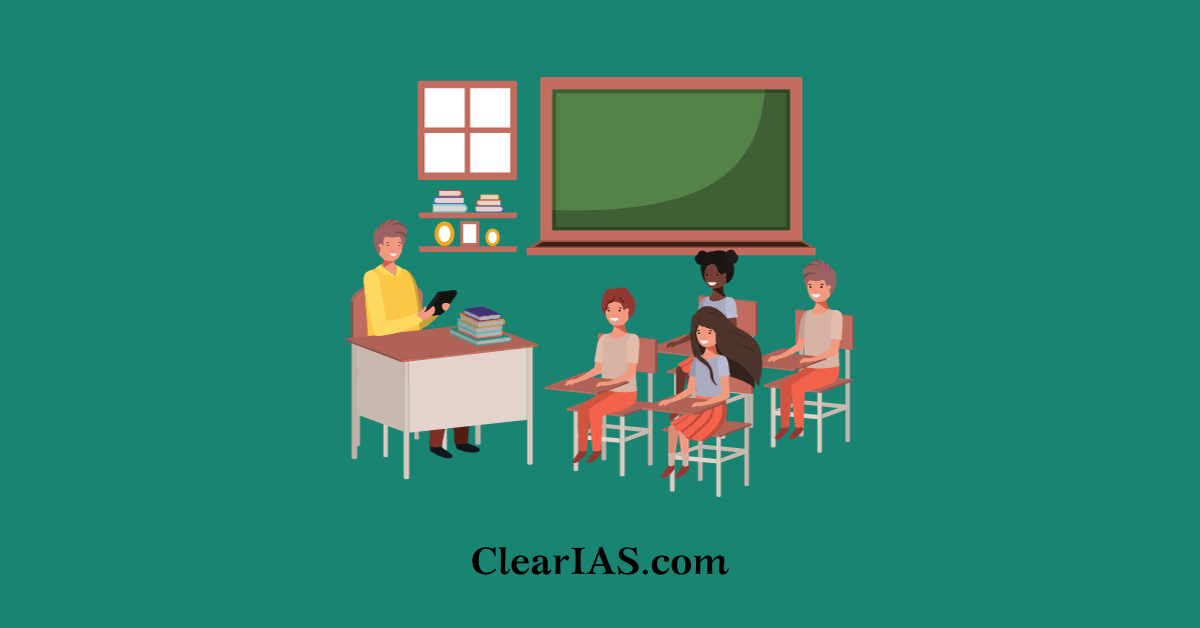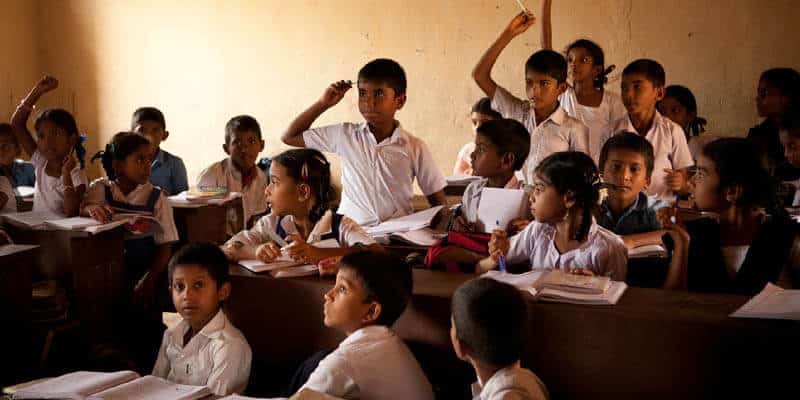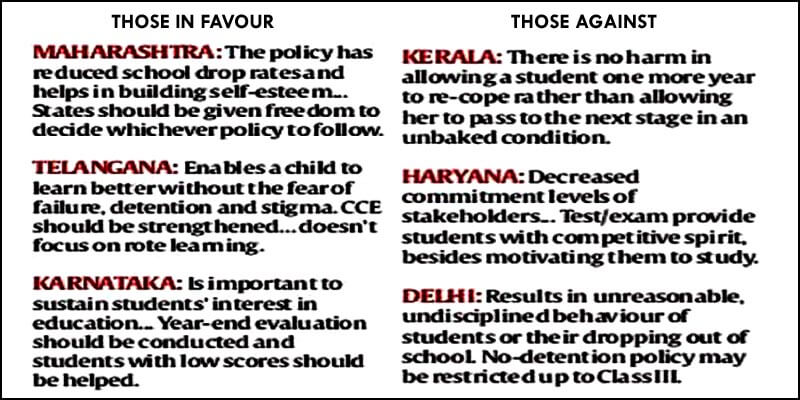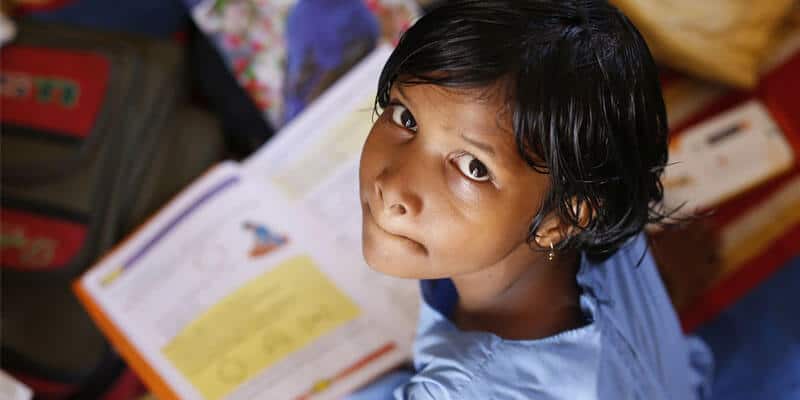 As per the current education system in India, all the students up to Class 8 will automatically be promoted to the next class. No one can be failed as per the Right to Education Act. This is known as the ‘No-Detention Policy’. Read here to learn more.
As per the current education system in India, all the students up to Class 8 will automatically be promoted to the next class. No one can be failed as per the Right to Education Act. This is known as the ‘No-Detention Policy’. Read here to learn more.
An expert committee headed by T S R Subramanian set up to formulate the new National Education Policy had last year recommended that the ‘No-Detention Policy’ be reviewed and exams be held from Class VI. Recently, the Union Cabinet has approved the scrapping of the no-detention policy in schools till Class VIII.
In this article, we discuss if the no-detention policy should be scrapped from the next academic year. Has the no-detention policy negatively impacted the quality of basic education in the country? Let’s see.
Read: No-Detention Policy 2024: Centre Scraps the no-detention policy
What is the ‘No-Detention’ policy?
- As per the No-Detention Policy under the Right to Education Act, no student can be failed or expelled from school till the completion of elementary education covering classes 1 to 8. All the students up till Class 8 will automatically be promoted to next class.
- The essence of the policy is that children should not be ‘failed’ and detained up to Class 8. There are no “examinations” in the narrow traditional sense of the word up to Class 8. Instead, the Act mandates a process of Continuous and Comprehensive Evaluation (CCE) to assess and evaluate the student’s learning.
The Right To Education (RTE) Act
- The Constitution (Eighty-sixth Amendment) Act, 2002 inserted Article 21-A in the Constitution of India to provide free and compulsory education of all children in the age group of six to fourteen years as a Fundamental Right in such a manner as the State may, by law, determine.
- It means that every child has a right to full-time elementary education of satisfactory and equitable quality in a formal school that satisfies certain essential norms and standards.
- It came into effect on 1 April 2010.
The RTE Act provides for
- Every child in the age group of 6-14 has the right to free and compulsory education in a neighbourhood school, till the completion of elementary education.
- Private schools will have to take 25% of their class strength from the weaker section and the disadvantaged group of the society through a random selection process. The government will fund the education of these children.
- No donation and capitation fee is allowed.
- No admission test or interview either for child or parents.
- No child can be held back, expelled and required to pass the board examination till the completion of elementary education.
- There is provision for the establishment of commissions to supervise the implementation of the act.
- A fixed student and teacher ratio is to be maintained.
- All schools have to adhere to rules and regulations laid down in this act, failing which the school will not be allowed to function. Three years moratorium period has been provided to school to implement all that is required of them.
- Norms for teachers training and qualifications are also clearly mentioned in the act.
- All schools except private unaided schools are to be managed by School Management Committees with 75% of parents and guardians as members.
Why is the No-Detention Policy reconsidered?
- Various states, including Delhi, have raised serious objections against the no-detention policy, citing it as a reason of high failure and dropouts in classes 9 and 10.
- Also, it is criticized that due to the no-detention policy, students do not focus much on education as they already have it in their mindset that they will be promoted to the next class even if they don’t perform well.
What is the new proposal?

When the no-detention policy is scrapped, an enabling provision will be made in the Right of Children to Free and Compulsory Education Amendment Bill which will allow states to detain students in class 5 and class 8 if they fail in the year-end exam.
Reasons why ‘no-detention policy’ is criticized
- Negative impact on the standard of education: Most of the schools in interior places are running without any teachers. Hence, if the ‘no-detention policy’ continues, it will leave a negative impact on the standard of education in India and force the children to face more harsh future.
- No reward for hard work: This policy has led to students developing a lackadaisical attitude, with there being no risk of failing. It also makes no distinction between good and bad students, and between those who work hard and those who don’t. Thus it makes no effective way to implement a good level of teaching and learning.
- Apathy from teachers: With the policy in place, the Education Department does not take steps to revamp itself and the teachers do not take the pain to ensure a good education for the children.
- Dark future of students: Students coming from poor economic background face problem in their coming life because of no good education in the schools.
- Will affect the women empowerment programs: The girls especially will face a major problem if not getting a proper education in the schools.
- Zero academic outcomes: If no merit is checked while giving promotion to another class, the children will never learn the importance of studying and acquiring knowledge. It will lead to a poor academic outcome in classes.
Reasons why ‘no-detention policy’ is supported
Stemming dropouts from the schools due to peer pressure was the main reason the Right to Education Act included the no-detention provision. If it is reversed, many students would stop going to schools when they fail.
- The section 29 (2) (h) of the RTE Act makes a comprehensive and continuous evaluation (CCE) mandatory, wherein schools are expected to use test results to improve teaching and learning of the child. Unlike traditional board examinations, the CCE visualises evaluation as a diagnostic tool to improve learning. So scrapping the policy is not a solution, in fact, it should be modified and corrected. (Reference: Wikipedia)
- If a student is made to repeat a grade, there’s a strong chance he or she will discontinue learning. Also, there is no research which establishes that repeating a year helps children perform better. In fact, not much burden helps the child not to take studies as a burden.
- There can be modifications such as – each school should conduct exams to ascertain which student is weak in what subject. If the child is weak, the school should take additional classes or special coaching.
What is the stand of various states in this regard?

All States/UTs were asked to share their views on the No-Detention policy. 28 States have shared their views on the No Detention policy out of which 23 States have suggested a modification to the No Detention policy. (Reference: PIB)
Will scrapping the no-detention policy solve all problems?
- Flawed teachers’ training (the eye of many scams), social indifference to the plight of school teachers, rampant use of ad hoc teachers in small towns and villages, etc. have all substantively contributed to a failing school system. Only scrapping the policy is not going to drastically improve the standard of education in the country.
- According to some educationists, the policy was wrongly interpreted to create an environment in which the significance of evaluating a school-goer’s learning outcomes was undermined. Continuous Comprehensive Evaluation (CCE), that aimed to assess the child’s understanding of what was being taught in class at periodic intervals, proved to be a non-starter in many schools. The policy alone cannot be blamed for poor results.
- The teachers were not given adequate training to undertake this reform. They had no idea of what was to be evaluated, and how. In several schools, CCE was reduced to “project work”, which parents resented. The RTE’s provisions regarding the upgrading of school infrastructure and an increase in the teacher-student ratio — that would have created an enabling environment for the policy — were given a short shrift. Hence, the poor performance can be linked to a variety of other factors rather than just the no detention policy.
Way ahead
- The phenomenon of poor learning outcomes is the product of many factors which influence learning, and should not be conveniently pinned to the door of the no-detention policy. The steps that can be taken to improve learning outcomes can be:
- measuring learning level outcomes of all children on a regular basis,
- catalysing a “performance-driven culture” and rewarding high performers at every level,
- changing stakeholders’ mindset and preparing them for new provisions, in which parents were made responsible or accountable for full attendance of their children.
- The policy should be implemented in a phased manner and a scale-up to all classes should be undertaken only after the critical infrastructural, teacher strength and teachers’ skill-set requirements were fully met.
Conclusion

- Rather than addressing the core issues that affect the quality of education in the country, the entire focus seems to be shifting to bring back the pass/fail model.
- A greater level of seriousness on all sides is the need of the hour. It is high time steps are taken to remove the other flaws that exist.
- Hence, the policy should either be renovated with adequate changes to neutralize the ill effects or replaced with a new policy that would take a balanced approach. The prime objective should be to effect an all-round development of children and equipping them with life skills.
Related articles:
- Education in India
- Education in state list: Should it be restored?
- Early childhood care and education
Article by: Pooja Chaudhary






Nice article! Crisp and clear 🙂
I am teaching CBSE students for the last 30 years ….can see falling standards of. education …. no body is interested in studies ….no body is interested in teaching because of this policy …students have no fear of failing. …even students do not respect their teachers ….it is not Right to education but Right to certificate ….!!!
Very Nice and out standing speech
On 1st August 2018, the centre approved the scrapping of the No-Detention Policy, effective from the present academic year with a proposal that students can be detained in class 5 and 8 while providing a chance to reappear for the examination after two months Read More :
https://www.youngbhartiya.com/article/no-detention-policy-regressive-or-progressive
Thank you mam……. Great work
May I please know the credentials of m/s Pooja Chaudhary?
very useful for hard working students
U r right 👍
a great job with the article
I am a teacher RTE students are extremely weak and not interested in education. They are sure to pass so even parents dont take interest. (I tried to draw attention to this fact and I was told avoid that child )
If education is to be improved all week students should be detained then only they will work hard to get good marks
why wait till 5th or 8th class?
IT IS THE RESPONSIBILITY AND CHALLENGE FOR TEACHERS TO COPE WITH THE SITUATION. JUST SCRAPPING THE RTE ACT WILL NOT BRING ANY CHANGE.
IT SHOULD BE A CO-ORDINATION BETWEEN THE TEACHERS-PARENTS AND STUDENTS.
WE SHOULD ALSO THINK ABOUT THE DEMORALIZING AND NEGATIVE THOUGHTS IN CHILDREN.
IT IS BETTER TO THINK POSITIVELY AND TRY TO INSTILL VALUES IN STUDENTS AND GIVE THEM MORE OPPORTUNITY BY GIVING EXTRA CLASSES IN ADDITION TO CCE TO WEAKER OR SLOW LEARNER STUDENTS.
Very good speech
No-detention policy needs be continued, because it is good and encouraging. This policy reinforces the right to education to all. There will be bright students and not so bright students everywhere. It is okay to have grading systems in classes to encourage good students and help not so good students to improve, but detention is the way too harsh policy. We must begin to understand slow progress in poor students is still good progress, little progress in poor students is still good progress. What all kids need is encouraging and helping environment. What all school should do is creating the encouraging and helping environment. If a child is not performing up to the mark, it’s their teachers who must find out ways to improve the child. The management much provide individual attention to not so good student, instead of blaming parents and encouraging private tuitions. The schools must ensure that they only hire quality teachers with passion to teach. Kids must not be detained for the fault of grown and educated adults. What all schools must do is keep investing their time and energy in nourishing all students as one community. All students must be promoted up to 9th grade. When they are in 10th, they will be matured enough to understand they have to push themselves even harder because they are appearing for public exam. Let them repeat the subjects they failed, if they have to. Based on their performance and willingness they can decide what they want to pursue further.